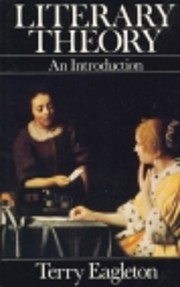

Pulse en una miniatura para ir a Google Books.
|
Cargando... Una introducción a la teoría literaria (1983)por Terry Eagleton
 Actualmente no hay Conversaciones sobre este libro.   ) )Although it isn’t quite “easy reading”, Literary Theory condenses major philosophical-literary movements into somewhat accessible summaries and histories. Eagleton handles straightforward theories like reception theory and psychoanalysis well, but the more enigmatic areas of semiotics and post-structuralism are best left uncondensed. Okay so as An Historian, I don’t think I need to be convinced hugely of the major interventions here about identifying these literary theory movements as being historically grounded and appearing at specific times with specific politics—and that they are in fact deeply imbued with politics. But I do think that Eagleton does so clearly and convincingly. It was also very useful to have these movements described to me, a person who is not at all familiar with most of them except maybe post-structuralism very loosely. The psychoanalysis chapter in particular I think takes Freud seriously in a way that almost no one seems to (for better or for worse.) The one flaw I would really highlight is that Eagleton references the Russian Formalists a LOT and I don’t think ever explains Formalism? (I really only noticed this because he DOES spend an entire chapter doing so in How to Read a Poem, and I realized that I finally understood what he was talking about.) And again, maybe that’s something that you have a better understanding of if you’re like a student of Literature and not just an idiot off the street like me. The conclusion of the book really was what made me stand up and applaud, even if, of course, the afterword to the edition I read explains why perhaps some of the things he called for in that conclusion didn’t play out as he had maybe wanted or hoped. But I found the book on the whole to be really valuable if not as immediately delightful as his other works that I’ve read. Literary Theory is closely aligned with Political Theory. This is what I have taken away from this book and also understood from other theory books that I have read. The mindset of the day, the views on women, labor, ethnic groups, God, etc. all played a part in how literature was viewed and dissected and analysed throughout the years. It was an entertaining ride, to say the least. I learned early on that Terry Eagleton is not a capitalist. He goes through the various theories from the 19th century on and critiques each of them harshly. He's not as harsh on deconstuctionism and Derrida as he is on some of the other theorists. For a non-fiction book, this was certainly fast paced and very interesting. I did not expect it to be as politically charged as it was. I enjoyed it immensely. I may have ended the book thinking "Is it all pointless or what?" but I still gave the book 4 stars because I had a hard time putting it down. I'm not well versed in literary theories myself to even begin to formulate a personal opinion on this subject, but I liked this book. I admit I agreed with a lot of what Eagleton had to say about our society. This book seems to serve three functions. First, it's a reasonable introduction to twentieth century literary theory, not including new historicism. Eagleton doesn't seem to have bothered to read much of the new criticism or the poetry associated with it (for instance, he says The Waste Land "intimates that fertility cults hold the clue to the salvation of the West"), and reads a bit too much English class structure into American life. But he's quite good on reception theory, structuralism and post-structuralism (although he's far too kind to Derrida, and far, far too kind to Kristeva). Second, it's an exercise in 'Marxism' of the most idiotic kind, which believes that anyone who holds an ideal (e.g., a harmonious society) and reads literature is just "submitting to the political status quo." For someone so keen on bringing politics into things, it's odd that Eagleton spends so little time thinking about the ways that reading literature as an image of harmony and so on might best be considered expressions of *yearning for* rather than *belief in* a harmonious society. Third, it's a shining example of what literary writing really should be like: polemical, cut and thrust, no nonsense attacks on one hand; rigid statements of faith and belief on the other. You'll know what Mr Eagleton stood for in the '80s once you've read about three pages of this. We're taught today not to say anything that anyone might disagree with- not only is that no fun, it's no way to advance any discussion. This book is seriously, seriously flawed, but I'd much rather re-read it than the essays collected in Cambridge's 'History of Literary Criticism' any day. Finally, I wonder how Terry feels about his constant attacks on religion in this book. Some might say he was just trying to fit into the radical, epater '80s, no? sin reseñas | añadir una reseña
Las corrientes como el estructuralismo, el postestructuralismo, la semi tica y la cr tica psicoanal tica, son estudiadas desde una perspectiva cr tica inteligente, Para culminar con una exposici n de los lineamientos de la cr tica pol tica. Con ello, Eagleton abarca las principales direcciones del pensamiento cr tico sobre la teor a literaria. No se han encontrado descripciones de biblioteca. |
Debates activosNingunoCubiertas populares
 Google Books — Cargando... Google Books — Cargando...GénerosSistema Decimal Melvil (DDC)801.950904Literature By Topic Literary Theory Literary theory and criticism Biography And History By Period 20th CenturyClasificación de la Biblioteca del CongresoValoraciónPromedio: (3.85) (3.85)
¿Eres tú?Conviértete en un Autor de LibraryThing. |
||||||||||||||||||||||||||||||||||||||||||||||||||||||||||||||||||||||||||||||||||||||||||||||||||||||||||||||||||||||||||